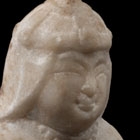J.J. Lally & Co., Oriental Art / New York City, New York
MenuPast Exhibition
Two Thousand Years of Chinese Sculpture
March 17-29, 2008
13.
A SMALL WHITE MARBLE SEATED FIGURE OF A ‘FOREIGNER’ WITH LION CUB
Tang Dynasty, dated by inscription 732
the simply carved figure with ‘foreign’ features, his hair covered with a Turkic headdress tied with straps and with a long flap over his neck at the back, wearing a wide cowl with beaded collar over his shoulders, his long pantaloons tucked into high boots, holding a small lion cub in his lap, seated with his feet in front and the toes of his boots pointed out, his broad face simply carved with eyes half-closed and a contented expression, on an integral solid circular plinth incised with a dedication of twenty-three Chinese characters along the front, the crystalline white marble showing scattered traces of original pigments and heavily encrusted with hardened earth from burial on the underside and part of the back.
Height 4 7⁄8 inches (12.5 cm)
The inscription may be read as Kaiyuan er shi nian san yue liu ri fo di zi Zhang Erniang wei x x x chang ming gong yang, which may be translated as “[dedicated on] the twentieth year of the Kaiyuan reign, sixth day of the third month, by Buddhist disciple Zhang Erniang for x x x, forever in attendance [of the Buddha],” the regnal date corresponding to A.D. 732.
A comparable small Tang stone figure of a man seated on a block base, with his feet in the same distinctive position, found in a hoard of Buddhist sculptures unearthed at Laohucheng village, Tongguan county, Shaanxi province in 1963, is illustrated in the catalogue of the recent exhibition at China Institute Gallery by Juliano, Buddhist Sculpture from China: Selections from the Xi’an Beilin Museum, New York, 2007, p. 98, no. 45, tentatively identified by the author as a monk or possibly a dwarf.
唐 開元二十年銘 漢白玉供養胡人造像 高 12.5 厘米
